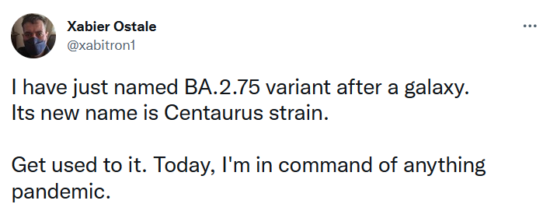Rejected monkeypox names, variant name is coined, costly pharmacy loss, and more
18 Aug 2022
Posted by Andrew Kantor
Two meds, one flu treatment
There’s one treatment for the flu: Tamiflu. The rest is treating symptoms and making patients comfortable until it passes. But now Canadian infectious disease experts have found what they think “could be part of a one-two punch” to treat it … in mice, at least.
That second punch: antibody therapy. Yeah, the same stuff used to treat Covid-19. When combined with antivirals like Tamiflu, “the drugs improved the virus-fighting properties of the antibodies” and helped trigger the immune system to kill the virus before it can spread.
Their hope, of course, is that this works on humans — especially high-risk groups during next flu epidemic.
A good bit of vaping news
Switching to e-cigarettes doesn’t seem to increase nicotine dependence. That doesn’t mean vaping is better in terms of addiction, just that it isn’t worse. (And there’s the advantage of skipping the whole “tar and smoke” thing … although e-cigs have their own set of nasty chemicals.)
Penn State researchers found that, just because vaping makes it easier (and a bit more socially acceptable) to get a nicotine fix, it doesn’t mean there’s a greater chance of addiction.
Opioid fallout
Pharmacies lose big in Ohio
CVS, Walgreens, and Walmart were ordered to pay $650.6 million to just two Ohio counties after a jury decided “that the companies helped create a public nuisance in Lake and Trumbull counties by over-supplying addictive pain pills.”
Of note: This is the first time that pharmacy chains have had to pay for their role in the crisis. The pharmacies, of course, argued that they can’t be held liable for filling legal prescriptions; they plan to appeal.
Endo goes bankrupt
Endo Pharmaceuticals, which is (was) $8 billion in debt while facing thousands of lawsuits for its role in the opioid crisis, is the latest opioid manufacturer to file for Chapter 11 bankruptcy, following in the footsteps of Purdue Pharma and Mallinckrodt.
Yes, but what about me?
What does the Inflation Reduction Act mean for pharmacy? Glad you asked. NCPA has the answers in a two-page PDF.
Sleep without drugs
People are getting to sleep and using fewer prescription meds to do it. That’s what University of Florida health scientists found looking at data from 29,400 people from 2013 to 2018.
It wasn’t a small decline, either — overall, they found a 31% overall decline in the use of common sleep medications — “a trend thought to be linked to a greater awareness of the potential pitfalls posed by these prescriptions.” But for those over 80, it was even bigger: an 86% decrease.
Big ol’ caveats: First, it only looked at prescription sleep meds, not OTC drugs like melatonin. Second, the data are only through 2018, and there have been some changes in the world since then that might keep people up at night.
Namey McNamechoice
Despite the temptation (and the official submission), the WHO will not be renaming monkeypox to “Poxy McPoxface.” Nor will it choose “TRUMP-22*,” although “Mpox” is in the running as the agency continues to consider a new name in the hopes that the public will stop calling monkeypox, monkeypox.
“It’s very important we find a new name for monkeypox because this is best practice not to create any offence to an ethical group, a region, a country, an animal etc,” said a spokesperson, implying that “chickenpox” and “swine flu” will also receive new names.
* “Toxic Rash of Unrecognized Mysterious Provenance of 2022” (really)
Captain Obvious treats himself
“Patients Have Higher Health Care Use After Covid-19 Infection”
The next Covid variant
Should you worry about Centaurus, a subvariant of Omicron? Who knows? Not the experts.
Centaurus, aka Omicron BA.2.75, is spreading in India and at least 20 other countries, but it’s not clear whether it will be worse than the current BA.5. In fact, getting infected by BA.5 might reduce the risk of Centaurus (and getting boosted this fall should also protect against it).
And if you’re wondering why a sub-variant gets to have a name, it’s because some guy on Twitter called it that … and it stuck.

Non-pharma, good Georgia health news story of the week
Georgia used to have among the highest number of high school football player deaths in the country. That’s changed in the last decade, and now Georgia’s new regulations “have become a model for other states looking to protect student athletes from the heat.”


